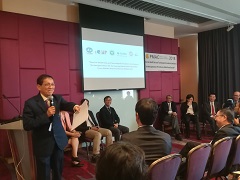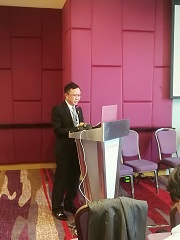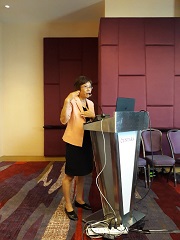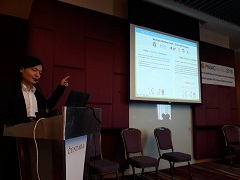- Home
- Technical Cooperation Projects
- Index of Countries
- Asia
- Thailand
- The Partnership Project for Global Health and Universal Health Coverage
- Project News
- Thailand and Japan are in a long-term collaboration to improve data utility for advancement of UHC
Project News
2018-01-30
Thailand and Japan are in a long-term collaboration to improve data utility for advancement of UHC
BANGKOK, 30 January 2018 – The Institute for Global Health Policy Research (iGHP), National Center for Global Health and Medicine (NCGM) and "The Partnership Project for Global Health and Universal Health Coverage (GLO+UHC)" (Thailand Ministry of Public Health (MOPH), National Health Security Office (NHSO) and Japan International Cooperation Agency (JICA)) co-organized the PMAC 2018 side meeting on "How Can Health Data and Technological Innovations Contribute to the Next-generation UHC for Ensuring Global human Security?".
Considered as a continuation of the side event "The Future of Health Systems: The Role of data health in the Era of the Next-generation UHC" held at UHC Forum 2017 in Tokyo on 12 December 2017, this event aims to share experience and discuss new strategies to design reliable and sustainable health systems through effective use of health data and information and communication technology (ICT) which could ensure human security at individual levels irrespective of their locations. In this era of sustainable development goals (SDGs), it is indispensable that new innovations and technologies such as ICT can contribute to identifying the bottlenecks of the current health systems and also to integrating health data which can tremendously assist policy making and planning to manage resources more efficiently. As a result, the application of innovations and ICT could help pave the way to the "Next-generation UHC" which is built on the principle of integration and empowerment, people-centered and leaving on one behind.
The experts from various countries and global partners shared their experience and expertise, and had a forum on several issues: how to make use of available data, what kind of innovative approaches to making health systems people-centered, efficient, and sustainable, and how ICT utilization can revolutionize the quality and efficiency of current health systems and integrate health services for UHC.
Ms. Netnapis Suchonwanich, Former Deputy Secretary-General, NHSO, gave a presentation on Thailand's efforts to achieve a people-centered health information system. She also made mention of a people-centered and cloud-based health profiles of Thailand for which Japan, and Thailand are currently striving to collaborate and create a roadmap. Professor Hiroaki Miyata, Director of the Department of Global Health Systems and Innovation at iGHP, explained challenges and prospects of the next-generation UHC as well as the concept of a Person-centered Open Platform for wellbeing (PeOPLe). Dr. Defriman Djafri, Dean, Faculty of Public Health, Andalas University, introduced university-government partnership in Indonesia as evidence-based health strategies for achieving UHC. Dr. Tsunenori Aoki, Senior Deputy Director, Human Development Department, JICA, shared his experience in strengthening health system of LMICs namely Ghana, Nigeria and Myanmar through customized training on health information systems. Mr. Luong Chi Thanh, Deputy Director General, Electronic Health Administration, Ministry of Health Vietnam, gave a presentation on Vietnam's current health ICT situation and the government commitment toward eHealth application, particularly the initiative on Electronic Health Architecture Enterprise. Mr. Kongkiat Kespechra, CEO Group 3 Bangkok Hospital Pattaya, elaborated the hospital OS (Open source) application which empower individual to record their own personal health data and use as a dashboard by a case manager for systematic monitoring and evaluation of patient's health. Dr. Mukesh Chawla, Advisor to the Senior Director, the World Bank, stressed the importance of close collaboration and partnership at national and global levels toward achieving global health security.
This event was well-received by more than 80 participants that consisted of ministry officials, developing partners, academia, private sectors and civil societies from various countries.




- About JICA
- News & Features
- Countries & Regions
- Our Work
- Thematic Issues
- Types of Assistance
- Partnerships with Other Development Partners
- Climate Change / Environmental and Social Considerations
- Evaluations
- Compliance and Anti-corruption
- Science and Technology Cooperation on Global Issues
- Research
- JICA Development Studies Program / JICA Chair
- Support for the Acceptance of Foreign HRs / Multicultural and Inclusive Community
- Publications
- Investor Relations
